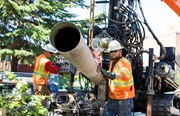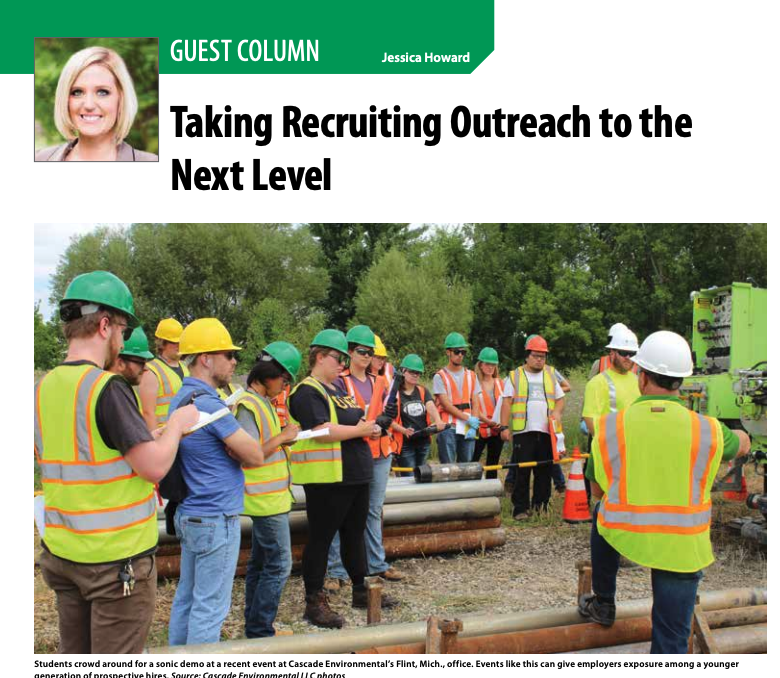The Next Step: Potential Career Paths After Your First Drilling Job
By: Jessica AlexanderEnvironmental drilling isn’t something that’s taught in most environmental sciences programs, and there aren’t many trade or vocational institutions in the United States that teach the particular skill set needed in our industry. So how exactly does someone get started? Many people began in the same place—as a driller assistant. But what does this role involve? What does someone need to be successful in it? How do you even get the jobs? And can your career grow from there?
WHAT DOES A DRILLER ASSISTANT ROLE INVOLVE?
A driller assistant role is entry-level, so it includes a lot of physical labor that some might find tedious, such as cleaning materials and tools, adding or breaking rods, or providing samples to an on-site inspector. However, the goal with this position is to get on-the-job education about what a drilling project entails, how different drill rigs operate, best safety practices, etc. It’s basically paid training that results in you having skills and knowledge you can’t gain in a classroom.
WHAT DO I NEED TO BE SUCCESSFUL AS A DRILLER ASSISTANT?
Applicants with virtually any background can be successful as a driller assistant or field assistant with the right mindset and dedication. The candidate filling an entry-level driller assistant role may have worked in construction, farming, mechanics, heavy machinery, welding, landscaping, logistics, environmental, military, or even retail.
There are several traits that successful driller assistants share. The most important is the ability and willingness to travel frequently, and the ability to work outdoors in a labor-intensive environment. Being flexible, adaptive and willing to learn is also key. Assistants work under the direction of a senior driller, who teaches and coaches them into developing skills that set the foundation for a career in drilling.
HOW DO I BREAK INTO THE DRILLING INDUSTRY?
Without prior experience in drilling, it may be more difficult to land your first job. Don’t give up, though—once you get a foot in the door, you won’t have this problem again. To give yourself the best shot at landing a driller assistant job, highlight any transferable skills you have from previous positions, being sure to identify how those skills would benefit the company or their clients.
You’ll also want to research environmental services to learn about the types of equipment used, the scopes and variety of projects, and the different types of clients environmental drilling companies serve. Using this knowledge during an interview will give you a competitive edge over other applicants.
Lastly, tailor your resume to the position for which you are applying. If you’ve traveled, work outdoors, or have any experience operating or handling equipment or machinery—no matter how big or small—you’ll want to include that on your resume. If you’ve completed any type of safety training courses, these are also highly sought after and should be highlighted, particularly OSHA related training.
WHAT DOES CAREER GROWTH LOOK LIKE IN DRILLING?
Once you have some experience under your belt, you have several options for how you want to grow your career in drilling. Let’s look at some of them.
Project Management
Some driller assistants who excel in the role may be promoted to driller and, eventually, senior driller. These positions give you greater responsibility and control over managing on-site projects. There’s also the possibility to grow into a project manager, project coordinator, or field supervisor position, depending on the needs within your office. At Cascade, with 33 offices nationwide, employees may even have the opportunity to transfer to another office for career progression and growth opportunities.
Shop Positions
Another possibility for the assistant is to move into a shop position, such as welder, mechanic, senior mechanic, or shop helper. These roles provide the opportunity to develop skills related to equipment upkeep and maintenance.
Management
Last but not least, a driller assistant may end up in management. The drilling industry is one that particularly values hands-on experience, and most leaders have worked in the field themselves as entry-level driller assistants.
If you’re interested in launching your career in the environmental services industry, you don’t need previous experience, just a positive mindset and willingness to learn.






